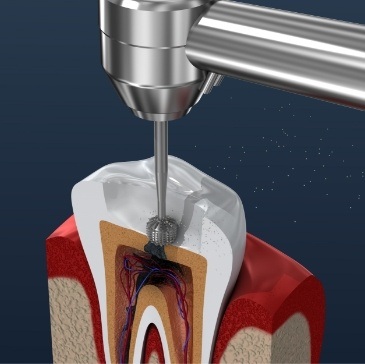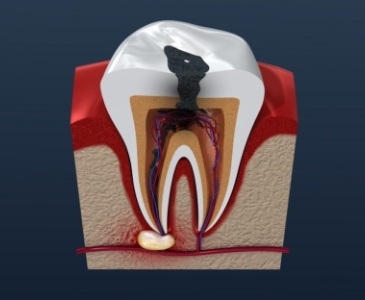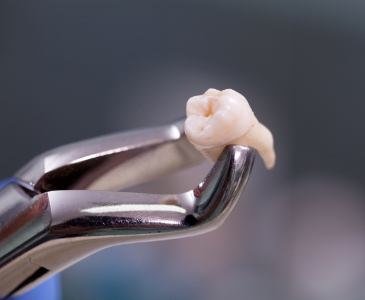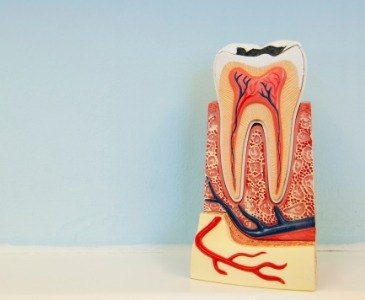Root Canal Treatment – Waco, TX
Saving Your Tooth and Relieving Your Pain

Does the mere mention of the phrase root canal make you shutter? You’re not alone. Over the years, root canals have gained a negative reputation, but without this therapy, the only other alternative treatment would be extraction. The truth of the matter is that a root canal saves your tooth after decay or damage and resolves the source of the pain you may be feeling. At Premier Family Dental, Dr. Rick Cofer has performed many root canals and practices dentistry with a gentle touch. Our team will go above and beyond to make sure that you’re completely comfortable from beginning to end, so don’t delay in calling our dental office. Let us help you get your smile back on track with root canal treatment in Waco.

Why Choose Premier Family Dental for Root Canal Treatment?
- High-Quality, Efficient Dental Care
- Sedation Dentistry for Nervous Patients
- Knowledgeable Dental Staff
What Is a Root Canal?
Root canal treatment is a procedure that removes the pulp, or the innermost layer that houses your tooth’s nerves. This part of your tooth can be very sensitive and can easily send a painful signal to your brain if bacteria find access to it. By taking out the pulp, Dr. Cofer and Dr. McNutt can ensure that your pain is gone and that any potential infection stops spreading.
We have lots of experience performing root canal treatment – in fact, we perform hundreds of these procedures every year. Because successful root canal treatment can determine whether or not you get to keep your tooth, you’ll want to receive your root canal procedure from someone you can trust.
Why Do I Need Root Canal Treatment?

There is a nerve that runs through your natural tooth, which is called the pulp. This nerve runs through what is called the root canal. When tooth decay or disease reaches the nerve that runs through the root canal chamber, root canal treatment may be needed to stop the infection and the pain. An infected nerve is one of the main causes of tooth pain.
Are you experiencing some of these symptoms?
- Tooth pain
- Tooth sensitivity
- Tenderness
- Tooth discoloration
- Lymph node swelling, tenderness, or even drainage
These can signal an infection that has taken hold of your tooth nerve and root. You may need root canal treatment.
In many cases, patients experience discomfort or pain before a root canal. However, you may feel just fine and still need root canal treatment. If this is your situation, consider yourself lucky! But don’t delay having treatment because the problem will only get worse with time, potentially causing additional damage to your smile and health.
What Happens During a Root Canal?

When you have a root canal, we make sure that you’re relaxed and comfortable from beginning to end. In fact, root canal treatment typically entails the same amount of discomfort as getting a filling. Your dentist will administer a local anesthetic to relieve your pain and numb the area. After that, they will remove the pulp, clean the chamber and seal it off to prevent future infection. At that point, we’ll take digital impressions of your teeth so that we can have your custom dental crown created. In the meantime, your dentist will attach a temporary one. When it’s ready, you’ll return to our dental office and have the permanent crown placed.
Recovering from Root Canal Treatment

Most of the time, recovering from a root canal is very similar to recovering from a filling. You may experience some soreness or mild pain, which can be managed with over-the-counter pain medication. However, this should calm down after a day or two. You may want to eat softer foods and avoid using that part of your mouth to bite and chew during this time. If the pain persists, then contact our dental office.
Understanding the Cost of Root Canals

Were you told that you need root canal treatment? If yes, then you likely want to know more about how much the procedure will cost before proceeding with the treatment. Even so, it’s technically impossible to have an accurate estimate of the price while there are multiple factors to consider. However, by scheduling an initial consultation with our team at Premier Family Dental, we’ll be able to assess your situation and determine the overall cost of a root canal in Waco. Keep reading or call our office directly to learn about the pricing of the procedure and what you can expect!
FACTORS THAT CAN AFFECT ROOT CANAL COST

The cost of a root canal will vary from patient to patient. That’s why you’ll need to visit our team first so we can evaluate your smile. That said, here are several factors that can impact the overall price of your root canal treatment:
- Type and location of your tooth: A root canal might be more expensive for molars than with the front teeth, as they have more roots involved.
- The complexity of the treatment: If a specialist needs to be brought in to treat your tooth, then you may need to pay more for the procedure.
- Additional services: Once your root canal is finished, you may need restorative dentistry treatment, like a dental crown, to protect your tooth. This can add to the overall expenses.
IS IT CHEAPER TO PULL MY TOOTH?

While it might seem tempting to want to remove the affected tooth, this can lead to other complications later on. The long-term consequences of this involve the need for a tooth replacement, as you’ll want to avoid any remaining teeth from shifting out of place. This can hike up the cost of dental treatments in the long run, whereas you can choose to preserve your natural tooth with a root canal instead. The longer you hold off on needed root canal treatment, the more likely it is that you’ll need to extract the tooth anyway.
DOES DENTAL INSURANCE COVER ROOT CANAL TREATMENT?

Root canal treatment is considered an essential procedure, so it’s common for dental insurance policies to offer coverage between 50-80% of the cost after meeting your deductible. However, every plan is different, so you’ll need to double-check with your insurance provider about the details and whether they can help you afford your procedure. You can also speak with our knowledgeable staff, and we’ll be happy to help you maximize your benefits!
OTHER OPTIONS FOR MAKING ROOT CANAL TREATMENT AFFORDABLE

Don’t have dental insurance? That’s okay! Our team understands the importance of being able to afford dental care for necessary treatments. For this reason, we offer flexible financing plans through CareCredit and Compassionate Finance—both of which break the overall cost into monthly installments with little to no interest. We also have an in-house membership plan so you can have access to discounts on various services (including root canal therapy) for one low annual fee!
Root Canal FAQs
Do you want to know more about root canals? Even though modern root canal treatment is a pain-free procedure, many patients still feel a little nervous. To help put you at ease, our team has collected some of the most common questions about the procedure and answered them below. For more information or to schedule a root canal in Waco, don’t hesitate to contact our office!
WHY DO I NEED A ROOT CANAL IF MY TOOTH DOESN’T HURT?
Intense tooth pain often leads people to the dentist’s office, where they may learn that they need a root canal. However, just because you don’t feel any tooth pain doesn’t mean that everything is fine. Your tooth’s nerves may have “died” (which means your tooth can no longer feel pain) due to trauma or infection without first feeling any discomfort. This is one reason why routine dental checkups are so important. Biannual dental exams allow your dentist to check for any signs of trouble that you may not have noticed.
ARE ROOT CANALS SAFE?
Faulty research conducted almost a century ago has led to persistent rumors claiming that root canals are unsafe and increase your risk of various medical conditions. However, the American Association of Endodontists (AAE) has thoroughly debunked this idea. Root canal treatment performed by a qualified dentist in Waco is very safe and has a success rate of about 95 percent. As with any medical procedure, there is a very small chance of some bacteria remaining in the tooth after a root canal and causing reinfection. While this is highly unlikely, it’s still possible, so be sure to let your dentist know if you experience intense swelling, pain, or fever in the days after your root canal.
CAN I TAKE ANTIBIOTICS INSTEAD OF GETTING A ROOT CANAL?
Antibiotics can treat bacterial infections in almost every part of the body – except teeth. Antibiotics travel through the bloodstream to target infections. However, because the bloodstream cannot reach the pulp of a tooth, antibiotics are not an effective way of fighting tooth infections. The only way to treat a tooth with infected pulp (besides extraction) is with a root canal.
HOW LONG DOES A ROOT CANAL TAKE?
Root canal treatment can usually be completed in a single appointment. In cases where two visits are required, your dentist will first place a temporary antibacterial medicine in the tooth, which should relieve your pain. Then, you’ll return later to have the inside of the tooth cleaned out. In general, a root canal takes anywhere between 30 to 90 minutes, depending on the location of the tooth. Molars have more root canals that must be disinfected than front teeth, so root canal therapy for back teeth usually takes more time.
CAN I EAT BEFORE A ROOT CANAL?
The answer to this question depends on whether or not you will be sedated for your root canal in Waco. If sedation will be used, your dentist may ask you to fast for a few hours beforehand, just to reduce the risk of nausea. If you won’t be undergoing sedation, it’s recommended that you eat a healthy meal at least a couple of hours before the procedure. Your mouth will be numb afterward, making it difficult to eat.
How long does it take to recover from a root canal?
Recovery times for root canals can vary significantly, but many patients can return to school or work the day after receiving the treatment. However, it might be best to take two or three days off if your job involves physical labor since vigorous exercise can interfere with the healing process. You can expect your mouth to be sore for several days, but this can be managed with prescribed or over-the-counter pain medication. You can also reduce your discomfort by sticking to soft foods and chewing on the side of the mouth opposite the treatment area. It’s important to continue brushing and flossing normally, but be especially gentle when working around the treated tooth. However, contact our Waco office if you experience pain that gets worse after several days or signs of infection like fever, fatigue, and swelling.
How much pain is normal after a root canal?
While the root canal procedure should be completely painless, you can expect to experience some soreness and discomfort in the following days. After the anesthesia wears off, you will probably notice some mild pain and sensitivity, but these issues should fade away after several days. You can typically manage this discomfort by taking over-the-counter pain medication. Avoid foods that are hard or chewy in the days following a root canal, as they can be stressful to the healing tooth. If you find that your discomfort is getting worse after several days, contact our Waco office for help.
What happens if you wait too long for a root canal?
Unlike many structures of the body, teeth cannot heal on their own, so advanced dental infections will only get worse without root canal treatment. You can rest assured that this procedure is necessary if your dentist recommends it, so it’s best to schedule it as soon as possible after you find out that you need one. While the pain of an infected tooth may disappear suddenly, this usually means the germs have killed the nerve ending inside the pulp and that the problem has only gotten worse. Delaying a necessary root canal treatment may even lead to secondary infections in the gums, other teeth, and possibly even other areas of the body, which can lead to life-threatening illnesses like sepsis. While a root canal is often the best way to resolve an advanced dental infection, a tooth that cannot be saved will need to be extracted to preserve the patient’s oral and overall health. If your tooth must be removed, our dentist will recommend an appropriate replacement.
